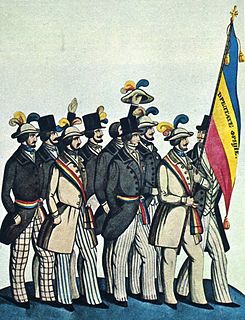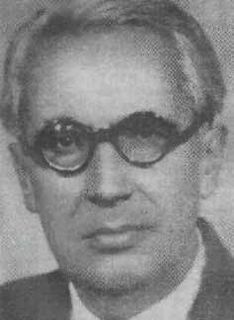
Wallachia or Walachia is a historical and geographical region of Romania. It is situated north of the Lower Danube and south of the Southern Carpathians. Wallachia is traditionally divided into two sections, Muntenia and Oltenia. Wallachia as a whole is sometimes referred to as Muntenia through identification with the larger of the two traditional sections.

Mircea the Elder was the Voivode of Wallachia from 1386 until his death in 1418. He was the son of Radu I of Wallachia and brother of Dan I of Wallachia, after whose death he inherited the throne.

Otopeni is a town in Ilfov County, Muntenia, Romania, some 15 km (9.3 mi) north of Bucharest along the DN1 road to Ploiești. It has 15,850 inhabitants, of which 99.0% are ethnic Romanians. One village, Odăile, is administered by the city.

Pitești is a city in Romania, located on the river Argeș. The capital and largest city of Argeș County, it is an important commercial and industrial center, as well as the home of two universities. Pitești is situated in the historical region of Muntenia. It lies on the A1 freeway connecting the city directly to the national capital Bucharest, being an important railway junction, with a classification yard in nearby Bălilești. The city houses the Arpechim oil refinery, and is a marketing center for the automotive industry, in particular, Automobile Dacia.

Nicolae Crețulescu was a Wallachian, later Romanian politician and physician. He served two terms as Prime Minister of Romania: from 1862 to 1863, and from 1865 to 1866. He was elected to the Romanian Academy. He was the 3rd president of the Romanian Academy from 1872 to 1873.

Michael the Brave was the Prince of Wallachia, Prince of Moldavia (1600) and de facto ruler of Transylvania. He is considered one of Romania's greatest national heroes. Since the 19th century, Michael the Brave has been regarded by Romanian nationalists as a symbol of Romanian unity, as his reign marked the first time all principalities inhabited by Romanians were under the same ruler.

Dealul Spirii is a hill in Bucharest, Romania, upon which the Palace of the Parliament is now located.

The Saint Sava National College, Bucharest, named after the Serbian Saint Sava, is the oldest and one of the most prestigious high schools in Romania. It was founded in 1694, under the name of the Royal Academy of Bucharest.

The Sighet prison, located in the city of Sighetu Marmației, Maramureș County, Romania, was used by Romania to hold criminals, prisoners of war, and political prisoners. It is now the site of the Sighet Memorial Museum, part of the Memorial of the Victims of Communism.

The House of Drăculești were one of two major rival lines of Wallachian voivodes of the House of Basarab, the other being the House of Dănești. These lines were in constant contest for the throne from the late fourteenth to the early sixteenth centuries. Descendants of the line of Drăculești would eventually come to dominate the principality until its common rule with Transylvania and Moldavia by Mihai Viteazul in 1600.

The Wallachian Revolution of 1848 was a Romanian liberal and nationalist uprising in the Principality of Wallachia. Part of the Revolutions of 1848, and closely connected with the unsuccessful revolt in the Principality of Moldavia, it sought to overturn the administration imposed by Imperial Russian authorities under the Regulamentul Organic regime, and, through many of its leaders, demanded the abolition of boyar privilege. Led by a group of young intellectuals and officers in the Wallachian Militia, the movement succeeded in toppling the ruling Prince Gheorghe Bibescu, whom it replaced with a Provisional Government and a Regency, and in passing a series of major progressive reforms, first announced in the Proclamation of Islaz.

Constantin C. Giurescu was a Romanian historian, member of the Romanian Academy, and professor at the University of Bucharest.

Alexandru Papadopol-Calimah was a Moldavian-born Romanian historian, jurist, and journalist, who served as the Minister of Foreign Affairs and Minister of Culture of the Principality of Romania. As a maternal member of the Callimachi family, he had high aristocratic origins, but was a commoner on his father's side; he spent most of his life in the Moldavian town of Tecuci, whose history was a focus of his academic activity. He joined the Moldavian civil service in 1855, as a Spatharios in service to Prince Grigore Alexandru Ghica, and participated in applying Ghica's reforms. Papadopol-Calimah consequently discarded his Greek-and-Hellenized background to become an exponent of Romanian nationalism, supporting a political unification between Moldavia and Wallachia, which came about in 1859. He first served in the unified administration established by Domnitor Alexandru Ioan Cuza, rising from Prefect to State Council member, then to cabinet minister. Throughout his career, he remained closely aligned with Vasile Alecsandri and Mihail Kogălniceanu, and later also with Bogdan Petriceicu Hasdeu.

Constantin Giurescu was a Romanian historian. In 1914, he became a titular member of the Romanian Academy.

Dinu C. Giurescu was a Romanian historian and politician.
Giurescu is a Romanian surname that may refer to:

Petre P. Panaitescu was a Romanian literary historian. A native of Iași, he spent most of his adult life in the national capital Bucharest, where he rose to become a professor at its main university. As such, he challenged various aspects of the dominant nationalist historiography. However, he also joined the ultra-nationalist Iron Guard, and headed the university during the movement's brief time in power. After the Guard was violently suppressed at the beginning of 1941, he lost his professorial position. When a communist-dominated government entered office in early 1945, he was arrested and imprisoned. Panaitescu was freed by the end of the year, the new authorities finding useful his theories of Slavic influence on Romania's national trajectory. He worked as a researcher in the latter part of his career, retiring in 1965, two years before his death.
Constantin P. Olănescu was a Wallachian, later Romanian politician.
Constantin Giurescu is a Romanian football manager who is currently under contract with Liga I side Academica Clinceni. Giurescu is known in Romania especially for his contribution in the youth sector as the founder, manager and vice-president of Sport Team Bucharest Academy.















